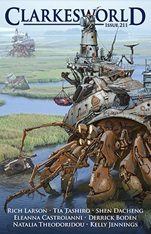“The Lark Ascending” by Eleanna Castroianni
“The Indomitable Captain Holli” by Rich Larson
“The Rambler” by Shen Dacheng
“The Oldest Fun” by Natalia Theodoridou
“An Intergalactic Smuggler’s Guide to Homecoming” by Tia Tashiro
“The Arborist” by Derrick Boden
“Occurrence at 01339” by Kelly Jennings
Reviewed by Victoria Silverwolf
A novella, a novelette, and five short stories appear in this issue.
In “The Lark Ascending” by Eleanna Castroianni, a dissident has been eliminated and his daughter’s memory erased by a repressive government. In an ironic form of supposed mercy, the government values the daughter’s intelligence, and allows her to be enhanced as one of the elites. Only the intervention of a small artificial intelligence, too minor to be considered a threat, allows her to capture something of her former life.
This is a bittersweet tale with powerful emotional appeal. Its quiet, unsentimental depiction of loss and hope is far more effective than a more melodramatic story would have been.
The novella “The Indomitable Captain Holli” by Rich Larson takes place at a future time when most of the planet is uninhabitable. Surviving humans live in two gigantic, neighboring arcologies. The inhabitants of each one think of the other as harboring barbaric enemies, and they occasionally make raids to capture children from each other.
An artificial intelligence taking the form of a cartoon pirate leads a little girl on a long, dangerous journey to the top of her building. Meanwhile, an AI from the enemy building pursues her for its own purposes. Her big sister and her boyfriend face many hazards as they try to find the lost girl, battling invading warriors from the enemy building along the way.
This is only a bare outline of a complex, fast-moving story with many surprises along the way. The action never stops, leaving the reader breathless. A major speculative element, revealed well into the text, is less plausible than the very realistic dystopian setting. The climax depends on people being very easily and very quickly persuaded to change their behavior, which strains credibility.
In “The Rambler” by Shen Dacheng, translated from Chinese by Cara Healey, a pedestrian bridge learns how to walk, eventually running away from the city and going into the forest. There is little to this surreal fantasy other than its basic premise, which is related in a dry, matter-of-fact way that may appeal to readers of Franz Kafka or Jorge Luis Borges.
“The Oldest Fun” by Natalia Theodoridou involves a game that draws young people, particularly those from difficult backgrounds, into other realities, often terrifying ones. The revelation of the narrator’s identity adds further mystery to an already enigmatic tale.
This puzzling horror story’s intent may be to point out how unwanted adolescents can disappear without anyone caring. Its ambiguity creates an eerie mood, but readers may find it too difficult a riddle to unravel.
As its title suggests, the novelette “An Intergalactic Smuggler’s Guide to Homecoming” by Tia Tashiro features a professional carrier of contraband from one planet to another. Her latest task is to convey hundreds of nearly microscopic sentient beings in her backpack from a world where they face genocide. Upon completion of this mission, she learns more about the situation, and why she seems to be so lucky in her illegal activities, leading to a change in her life.
The story is narrated in multiple flashbacks; for example, we learn that the smuggling of the tiny aliens was successful before we find out how it was accomplished. This tends to lessen the suspense of the early part of the story, although the same problem does not occur in the later sections. Although the miniscule extraterrestrials may seem a bit silly, the story makes for pleasant reading, both as light crime fiction and as an account of family relationships.
In “The Arborist” by Derrick Boden, a small team of survivors of a plague that devastated Earth use a bioengineered planet-wide tree to remove all the dangerous predators from an otherwise habitable world in order to allow later settlers to live there. Before the story begins, the mission has already resulted in disaster. One crewmember is dead, one is only recently recovered from a long coma, one hides on the deadly planet, and one remains isolated in her quarters.
The protagonist is the only android among the team. The man recovered from a coma uses it in an attempt to complete a mission that seems doomed.
This is an unrelievedly grim tale, from the plight of Earth to the voracious predators that inhabit the planet to the fates of the members of the team. The story raises the question of whether it is appropriate to destroy the ecology of an alien world for the sake of humanity, but the situation is so desperate that this hardly seems debatable.
In “Occurrence at 01339” by Kelly Jennings, an automated mining probe consisting of several artificial intelligences working together receives a message from the far reaches of the solar system. If they cannot prove that they are truly sentient—and, by extension, that humanity is—they and their creators (all of the human species) will be destroyed. They must prove this by asking no more than eleven questions.
The situation is inherently artificial, of course. The work is a clever, if minor, puzzle story with a provocative solution.
Victoria Silverwolf is working a lot of extra weekends for the next two months.
 Clarkesworld #211, April 2024
Clarkesworld #211, April 2024